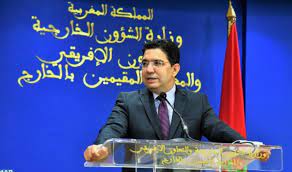APA-Rabat (Morocco) The meeting was organised by local civil associations, the Senegalese community in Morocco and the Catholic Church in Marrakech.
Since its launch at the end of last year, the Atlantic Initiative launched by the King of Morocco, Mohammed VI, to promote access to the Atlantic Ocean for the Sahel states, has continued to attract
interest.
On Tuesday 19 March, a number of academics, researchers, students, civil society players and members of the African community living in Morocco met in Marrakech to discuss the initiative.
The event was organised by local civil associations, the Senegalese community living in Morocco and the Catholic Church in Marrakech.
According to the participants, “the Royal Initiative offers new opportunities in the global economy and includes a series of positive points in terms of international relations and international balances that guarantee the kingdom a new positioning.”
The participants also pointed out that the Moroccan Initiative will also enable “the historic trade routes between Africa and the kingdom of Morocco to be relaunched, and the countries concerned to interact
fully economically with new destinations and economic groupings.”
For Mohamed El Ghali, Dean of the Faculty of Legal, Economic and Social Sciences at El Kelaa des Sraghna, part of Cadi Ayyad University, “the Atlantic Initiative launched by His Majesty King Mohammed VI on the occasion of the celebration of the 48th anniversary of the Green March, has had a great international impact, due to its integration dimension stemming from the fact that African countries
share a common geography, language, religion, customs and traditions, as well as a common destiny.”
The academic insisted that “the Royal initiative is adapted to a geopolitical context linked to the fact that the world is no longer as safe as it used to be, particularly in terms of international trade, where alternatives are being sought for trade in the Red Sea and the Indian Ocean,” areas facing major security risks.
“For Africa to be able to assume its geopolitical roles, it must have a minimum level of organisation and access to a series of maritime routes, given the importance of these routes for investment and the
movement of people and capital,” Mohamed El Ghali explained.
Abdelfattah El Belamachi, President of the Moroccan Centre for Parallel Diplomacy and Dialogue between Civilisations and Professor of International Relations at Cadi Ayyad University, said that “the
Atlantic Initiative of His Majesty King Mohammed VI, based on making Morocco’s infrastructure and capacities available to the countries of the Sahel, opens up new horizons and generates major economic
interactions with new economic destinations in South America, North America, Atlantic Europe and Great Britain.”
Rachid Chahmi, President of the Toubkal Academy of University Studies and Research, recalled “the cultural, religious and scientific influence of the city of Marrakech on the countries of the Sahel since
its foundation, and the factors that have contributed to it, stressing that this influence, which has contributed to the spread of the Malikite rite, confirms the centrality of the Ochre City in the
consolidation of strong diplomatic and spiritual relations between Morocco and these countries during this period of history.”
Boubacar Dieye, President of the Association of Senegalese Nationals Residing in Morocco, (ARSEREM), said that “the kingdom’s interest in the African continent is reflected in the countless visits by His
Majesty King Mohammed VI to a number of African countries, tours which have been highly successful and have contributed to the establishment of Moroccan companies operating in strategic sectors such as banking, construction, telecoms and industry, notably phosphates and cement.”
The meeting was supported by the Marrakech City Council.
AM/LOS/fss/as/APA


